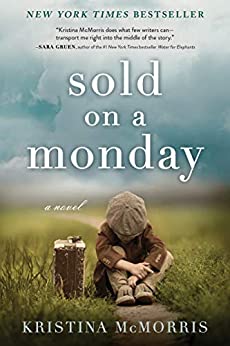
Sold on a Monday: A Novel by Kristina McMorris was inspired by an actual newspaper photograph that stunned the nation. Set in New Jersey during the Depression Era of 1931, the story is a stark reminder of the desperation felt during those bleak years.
Ellis Reed, a struggling Examiner reporter, aimlessly wanders around while his over-heated car engine cools. He spots a board with a handwritten sign propped on the step of a run-down porch:
2 children
for sale
He takes a photograph of the sign along with two children he sees playing in the yard. It’s a gut-wrenching scene, but not all that uncommon. Times were cruel in America. People were out of work, banks were closing. Families with children often couldn’t afford to feed them. Some parents sent their children to farms where they could work for food. Others gave up their children thinking they would have a better life.
Ellis writes a story to go with the picture and it’s picked up by national newspapers. But the story backfires and spins out of control.
Lily Palmer also works for the Examiner. Not many people know it, but she has a young son who lives with her parents in a nearby town. She’s the boss’s secretary, but hopes one day to have a column of her own. She gets involved in the story of the children for sale and, together with Ellis Reed, tries to salvage the wreck his article has wrought.
Sold on a Monday is a powerful novel that not only shows the desperation many people experienced during the Depression, but also conveys the power of love and of family. Author Kristina McMorris’s research is impressive as it delves into the mind-set of the era and the fortitude and grace it took to survive those years.


Thank you, Mary, for the review, which makes me want to read the book. It is tragic that circumstances force people to sell their children.
Thank you, Hema, for your comment. Yes, those were desperate times–I can’t imagine living through that.
This was a great story, read it in a few days. Great review, too!
Thank you, Natalie. Thank you for your comment. Sometimes we think we have it tough–the people that lived through this had to be tough.